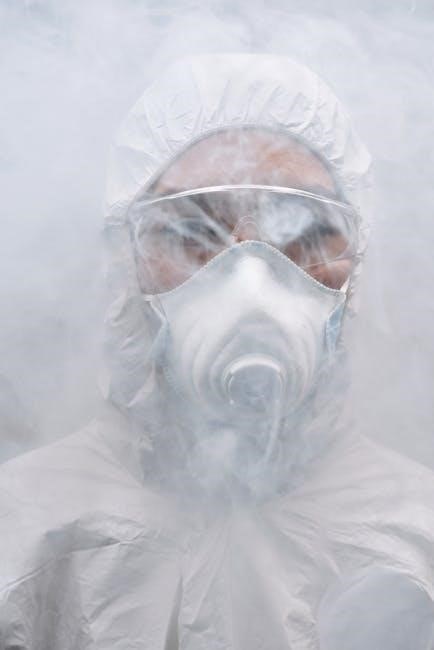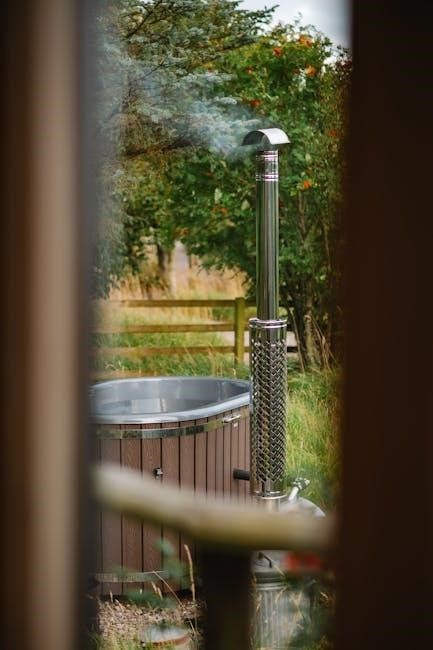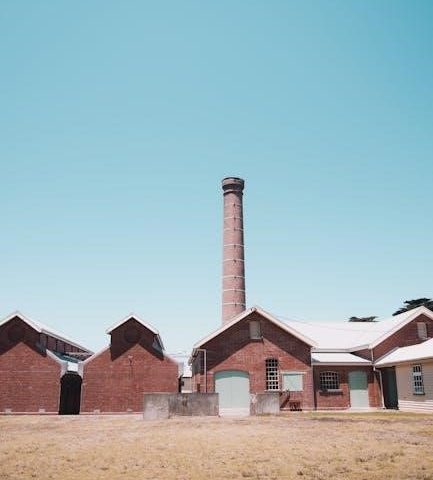Smoke alarms are compulsory in Victorian homes, ensuring early fire detection and reducing fatalities. Regulations mandate installation on every level, with devices meeting Australian Standards AS 3786, promoting safety and legal compliance.
Overview of Smoke Alarm Regulations in Victoria
Smoke alarms are mandatory in all Victorian residential properties, as per legislation effective since 1997. They must comply with Australian Standard AS 3786, ensuring reliability and effectiveness. Installation is required on every level of a building, near sleeping areas, and in each bedroom and living space. Both ionisation and photoelectric smoke alarms are permitted, provided they meet the standard. Regular maintenance, including monthly testing and annual professional inspections, is essential. Landlords are legally responsible for ensuring smoke alarms are installed and functional, with penalties applying for non-compliance; These regulations aim to enhance fire safety and protect lives.
Importance of Smoke Alarms in Home Safety
Smoke alarms are a critical component of home safety, providing early detection of fires and enabling timely evacuation. They significantly reduce the risk of fire-related injuries and fatalities by alerting occupants to potential dangers before situations escalate. According to Victorian regulations, smoke alarms are mandatory in all residential properties, underscoring their vital role in protecting lives and property. Properly installed and maintained smoke alarms act as a first line of defense against fire hazards, ensuring residents have precious time to respond effectively. Their presence not only saves lives but also contributes to a safer community.

Legislative Framework
Victorian smoke alarm laws are governed by the Building Act 1993 and Public Health and Wellbeing Act 2008, establishing compliance standards and ensuring fire safety in all properties.
Key Laws Governing Smoke Alarms in Victoria
Victorian smoke alarm regulations are primarily enforced under the Building Act 1993 and the Public Health and Wellbeing Act 2008. These laws mandate the installation of smoke alarms in all residential properties, including homes, units, and rental properties. Smoke alarms must comply with Australian Standard AS 3786, ensuring reliability and effectiveness. Failure to install or maintain smoke alarms can result in penalties, emphasizing the importance of adherence to these legal requirements to ensure public safety and prevent fire-related hazards.
Building Act 1993 and Public Health and Wellbeing Act 2008
The Building Act 1993 and the Public Health and Wellbeing Act 2008 are cornerstone legislations governing smoke alarm requirements in Victoria. The Building Act ensures smoke alarms are installed in accordance with building standards, while the Public Health and Wellbeing Act enforces mandatory installation in all residential properties. These laws require smoke alarms to comply with Australian Standard AS 3786, ensuring reliability and effectiveness. Non-compliance with these regulations can result in penalties, underscoring the importance of adherence to safeguard public health and safety in Victorian homes.

Installation Requirements
Smoke alarms must be installed on every level of Victorian residential properties, near sleeping areas and living spaces, ensuring compliance with Australian Standard AS 3786 for optimal safety.
Where Smoke Alarms Must Be Installed
Smoke alarms are mandatory on every level of Victorian residential properties, including houses, units, and townhouses. They must be installed on or near the ceiling in hallways outside bedrooms and in all living areas. Additionally, smoke alarms should be placed inside each bedroom for enhanced safety. Drafts from windows, doors, or air ducts can affect sensitivity, so alarms should not be installed near these areas. Hardwired smoke alarms are required in new properties, while battery-powered alarms are permitted in existing homes. Compliance with Australian Standard AS 3786 ensures proper installation and functionality.
Types of Smoke Alarms Permitted in Victoria
In Victoria, smoke alarms must comply with Australian Standard AS 3786. Hardwired smoke alarms are mandatory in new properties, while battery-powered alarms are permitted in existing homes. Photoelectric smoke alarms are recommended as they are less prone to false alarms and more effective at detecting smoldering fires. Dual-sensor alarms, combining ionization and photoelectric technology, are also accepted. Additionally, smoke alarms for the deaf or hard of hearing, such as those with vibrating pads or strobe lights, are available to ensure accessibility and safety for all residents.

Maintenance and Testing
Regular maintenance and testing are crucial to ensure smoke alarms function properly. Homeowners must test smoke alarms monthly and replace batteries annually to maintain effectiveness and safety.
Monthly Testing Requirements
Homeowners must test smoke alarms monthly to ensure they are functioning correctly. This involves pressing the test button to check the alarm sound and battery operation. Regular testing helps identify issues early, ensuring continuous protection. Additionally, smoke alarms should be cleaned to avoid dust buildup that might impair sensitivity. Tenants are also responsible for monthly tests in rental properties, with landlords required to ensure devices are operational. Proper maintenance enhances safety and compliance with Victorian regulations, safeguarding residents from potential fire hazards.
Annual Professional Inspection
Annual professional inspections are mandatory for smoke alarms in Victorian properties, ensuring compliance with safety standards. Licensed professionals conduct thorough checks, including testing functionality, cleaning devices, and verifying battery operation. This inspection complements monthly homeowner tests, providing an in-depth assessment of system performance. Landlords are responsible for arranging these inspections in rental properties, while homeowners must also adhere to this requirement. Annual inspections help identify and address potential issues, ensuring smoke alarms remain reliable and effective in emergencies, aligning with Victorian regulations and Australian Standard AS 3786.
Battery Replacement Guidelines
Smoke alarms in Victoria require regular battery replacement to ensure functionality. For alarms with removable batteries, replacement is needed annually or when the low-battery warning sounds. Use high-quality, smoke-alarm-specific batteries to maintain reliability. Hardwired smoke alarms with battery backup must have their batteries replaced every 12 months. Non-removable, 10-year lithium batteries are also permitted and must be replaced at the end of their lifespan. Testing post-replacement is essential to confirm proper operation. Failure to replace batteries can lead to non-compliance with Victorian fire safety regulations, increasing fire risks and potential penalties for homeowners or landlords.

Landlords and Rental Properties
Landlords in Victoria must ensure smoke alarms are installed in all rental properties, complying with AS 3786, and verify functionality at the start of each tenancy.
Responsibilities of Landlords
Landlords in Victoria must ensure smoke alarms are installed in all rental properties, meeting Australian Standard AS 3786. They are required to test alarms monthly and replace batteries annually. Smoke alarms must be operational at the start of each tenancy, and landlords must maintain records of testing and maintenance. Non-compliance can result in penalties under Victorian law. Landlords are also responsible for ensuring smoke alarms are installed on every level of the property and near sleeping areas, as mandated by regulations. Failure to meet these obligations can lead to legal action, emphasizing the importance of proactive compliance to ensure tenant safety and legal adherence.
Penalties for Non-Compliance
Non-compliance with smoke alarm regulations in Victoria can result in significant penalties, including fines and legal action. Property owners who fail to install or maintain smoke alarms according to the law may face financial penalties, which can escalate for repeat offenses. Authorities, such as local councils, enforce these regulations and may issue infringement notices or require court appearances. The penalties aim to ensure adherence to fire safety standards, protecting lives and property. It is crucial for landlords and homeowners to understand and comply with these regulations to avoid legal consequences and maintain a safe living environment.

Multi-Story Buildings
In Victoria, multi-story buildings require smoke alarms on each level, installed near bedrooms and living areas to ensure fire safety and rapid evacuation in larger homes.
Installation on Each Level
In Victoria, smoke alarms must be installed on every level of multi-story buildings, including houses, units, and townhouses. According to regulations, alarms should be placed near sleeping areas and living spaces to ensure early fire detection. This requirement applies to all residential properties and is designed to maximize safety and allow time for evacuation. Alarms must be installed on or near the ceiling and meet Australian Standard AS 3786. This ensures consistent protection across all levels, reducing fire risks and promoting a safer living environment for occupants.
Placement Near Sleeping Areas
Smoke alarms in Victoria must be placed near sleeping areas to ensure early detection of fires, enhancing occupant safety. Install alarms in hallways outside bedrooms or inside each bedroom if no hallway exists. This placement guarantees maximum alertness, especially for those less likely to detect fires quickly, such as the hard of hearing. Compliance with Australian Standard AS 3786 ensures alarms are effective in these critical areas, reducing fire risks and saving lives. Proper placement near sleeping areas is vital for timely evacuation and overall fire safety in residential properties.

Special Requirements
Victoria mandates special smoke alarm requirements for the hard of hearing, including vibrating alarms and strobe lights. Grant programs are available to assist with these installations.
Smoke Alarms for the Hard of Hearing
Smoke alarms for the hard of hearing are essential for ensuring safety. Victorian regulations require these alarms to include features like vibrating devices or strobe lights to alert individuals. These specialized alarms must meet Australian Standards AS 3786 and be interconnected to enhance effectiveness. Grants and financial assistance programs are available to help cover installation costs, making these life-saving devices more accessible. Proper installation and maintenance are crucial to ensure reliability, providing peace of mind for all residents, especially those with hearing impairments.
Types of Alarms Available
In Victoria, smoke alarms must comply with Australian Standard AS 3786. Common types include ionization chamber detectors, effective for fast-flame fires, and photoelectric alarms, better suited for smoldering fires. Hard-wired and battery-powered options are available, with interconnected systems recommended. Specialized alarms for the hard of hearing feature vibrating devices and strobe lights. All devices must meet safety and reliability standards, ensuring early fire detection and compliance with Victorian regulations.
Grant Programs for Special Alarms
Victorian government offers grant programs to assist individuals with disabilities in accessing specialized smoke alarms. These grants help cover costs for alarms equipped with features like vibrating devices and strobe lights, ensuring equal fire safety for the hard of hearing. Eligibility criteria and application processes vary, but they aim to support those needing tailored solutions. These initiatives promote inclusivity and safety, enabling all residents to meet smoke alarm regulations without financial burden. They are a vital resource for maintaining compliance and protecting vulnerable populations effectively.

Local Council and Compliance
Local councils enforce smoke alarm regulations in Victoria through regular inspections, ensuring AS 3786 compliance. They ensure properties meet standards and impose penalties for non-compliance.
Role of Local Councils in Enforcement
Local councils play a crucial role in enforcing smoke alarm regulations across Victoria. They conduct regular inspections to ensure compliance with AS 3786 standards and Victorian laws. Councils verify that smoke alarms are correctly installed in all residential properties, including rental homes. Additionally, they handle complaints and investigate non-compliance issues. Councils also provide educational resources to homeowners and landlords, outlining legal requirements and maintenance responsibilities. Their efforts help maintain public safety and reduce fire-related risks in communities.
Penalties for Non-Installation
Property owners who fail to install smoke alarms as required by Victorian law face significant penalties. Non-compliance can result in fines, with amounts varying based on the severity of the violation. Landlords and homeowners alike are held accountable, as smoke alarms are mandatory in all residential properties. Repeat offenses may lead to higher penalties or legal action. Local councils and authorities enforce these regulations strictly to ensure public safety. Non-installation not only risks lives but also results in financial consequences for property owners who neglect their legal obligations.
Australian Standards AS 3786
Australian Standard AS 3786 outlines requirements for smoke alarm installation, types, and maintenance, ensuring compliance with safety regulations in Victorian homes and properties.
Overview of AS 3786
Australian Standard AS 3786 provides detailed requirements for smoke alarm installation, maintenance, and performance in residential properties. It ensures devices are reliable, efficient, and meet safety standards. The standard outlines installation locations, types of alarms permitted, and testing protocols to maximize fire detection effectiveness. Compliance with AS 3786 is mandatory in Victoria, ensuring smoke alarms function optimally to protect lives and property. This standard is integral to achieving fire safety goals and is referenced in Victorian smoke alarm regulations for all homes and rental properties.
Ensuring Compliance with AS 3786
Compliance with AS 3786 is achieved through regular inspections and adherence to installation and maintenance guidelines. Smoke alarms must meet specific standards for sensitivity, placement, and performance. Professional certification ensures devices function correctly and are installed in appropriate locations. Landlords and homeowners must maintain records of testing and servicing to demonstrate compliance. Non-compliance can result in penalties, emphasizing the importance of following AS 3786 requirements rigorously. This standard ensures smoke alarms are reliable and effective, safeguarding lives and property from fire hazards.

Exemptions and Special Cases
Heritage buildings and rural areas may have unique considerations under Victorian smoke alarm regulations, requiring special permits or tailored solutions to meet fire safety standards effectively.
Heritage Buildings and Exemptions
Heritage buildings in Victoria may qualify for exemptions from standard smoke alarm regulations due to their historical significance. These exemptions are typically evaluated on a case-by-case basis, balancing preservation with safety. Property owners must consult with local authorities to determine if exemptions apply. Even with exemptions, alternative fire safety measures may be required to ensure occupant safety. Heritage buildings are not entirely exempt from smoke alarm requirements but may have tailored solutions that align with their unique architectural and historical features while still meeting safety standards.
Rural Areas and Special Considerations
Rural properties in Victoria may face unique challenges due to larger land sizes and isolated locations. Smoke alarms in these areas must still comply with AS 3786, but placement and power supply considerations are crucial. Hardwired smoke alarms with battery backups are recommended to handle potential power outages. Maintenance and annual inspections can be more challenging due to remote locations, necessitating proactive management by property owners. Some rural buildings, like barns, may have specific exemptions, though residential areas must still adhere to regulations. Ensuring fire safety in rural settings requires tailored strategies to address these distinctive conditions effectively.

Recent Updates
Victoria’s 2023 legislative changes strengthened smoke alarm regulations, emphasizing compliance with AS 3786 standards and mandatory installations in all residential properties, enhancing fire safety across the state.
2023 Legislative Changes
In 2023, Victoria introduced stricter smoke alarm regulations, mandating compliance with Australian Standard AS 3786 for all residential properties. Key updates include requiring smoke alarms in every bedroom and living area, ensuring devices are interconnected, and enforcing annual professional inspections. These changes aim to enhance fire safety, reduce fatalities, and align with modern safety standards. Non-compliance now carries significant penalties, emphasizing the importance of adhering to these updated laws to protect lives and property across Victoria.
Future Outlook on Smoke Alarm Laws
Victoria’s smoke alarm laws are expected to evolve with advancements in technology and safety standards. Future updates may mandate interconnected smoke alarms in all new constructions and require smart alarms that integrate with home systems. Stricter enforcement of maintenance and testing protocols is anticipated, along with potential incentives for landlords to upgrade to hardwired systems. The Victorian government may also expand requirements for specialized alarms, such as those for the hard of hearing, ensuring inclusivity and enhanced safety for all residents. These changes aim to maintain Victoria’s leadership in fire safety regulation.
Smoke alarm regulations in Victoria are essential for ensuring fire safety and protecting lives. Compliance with these laws is crucial for creating a safer living environment.
Victoria mandates smoke alarms in all residential properties, with devices meeting Australian Standard AS 3786. Installation is required on every level, including near sleeping areas. Landlords must ensure alarms are installed and functional, facing penalties for non-compliance. Maintenance involves monthly testing and annual professional inspections. Battery replacements are crucial for functionality. Multi-story buildings require alarms on each level, while special needs, like alarms for the deaf, are addressed with specific devices. Compliance with these regulations is vital for fire safety and legal adherence, ensuring the protection of lives and property across Victoria.
Final Thoughts on Smoke Alarm Safety
Smoke alarms are a critical component of home safety in Victoria, significantly reducing fire-related risks. Compliance with regulations ensures early detection, saving lives and property. Proper installation, maintenance, and testing are essential to maximize effectiveness. Landlords and homeowners must prioritize adherence to laws, as non-compliance carries penalties. Special considerations for the hard of hearing and multi-story buildings highlight the importance of tailored solutions. By following AS 3786 standards and staying informed about updates, Victorians can create safer living environments, fostering a community protected against fire hazards.
